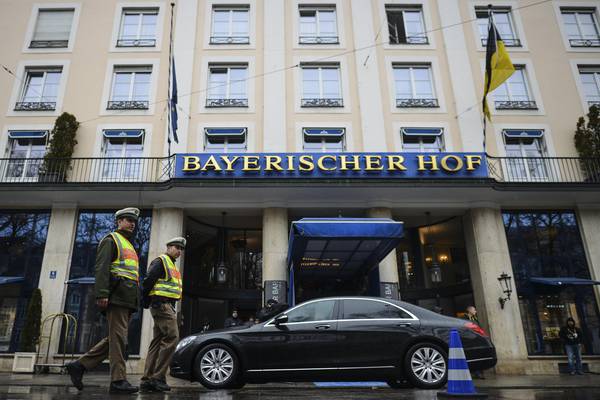Munich conference brings hope for clarity on US priorities
30 heads state and government, 80 foreign and defense ministers
17 February, 14:18(ANSA-AP) - BERLIN — Top world leaders, diplomats and defense officials are getting their first opportunity to meet with members of the Trump administration amid concerns over the new president's commitment to NATO and posture toward Russia.
Vice President Mike Pence, Defense Secretary Jim Mattis and Homeland Security Secretary John Kelly are leading the U.S. delegation to the Munich Security Conference opening Friday. The annual weekend gathering is known for providing an open and informal platform for allies — and adversaries — to meet in close quarters.
Chancellor Angela Merkel, U.N. Secretary-General Antonio Guterres, European Council President Donald Tusk and NATO Secretary General Jens Stoltenberg are among the group of more than 30 heads of state and government, 80 foreign and defense ministers and other officials expected to attend.
Trump set off alarm bells last month by calling NATO "obsolete," though has subsequently told European leaders he agrees on the "fundamental importance" of the military alliance. He has emphasized the need for all members to pay a fair share for defense, an issue that NATO leaders themselves have pushed for years.
Mattis told the alliance's 27 other defense ministers in Brussels on Wednesday that Trump has "strong support for NATO" and assured Stoltenberg that "the alliance remains a fundamental bedrock for the United States." However, Mattis also told fellow NATO members they need to increase their military spending by year's end or risk seeing the U.S. curtail its defense support.
Other stances — Trump's support for Britain's decision to leave the EU, his perceived closeness to Russia and inaugural pledge to put "America first" — also have raised "an unbelievable number of question marks," conference organizer Wolfgang Ischinger, a former German ambassador to the U.S., said.
Ischinger said expectations that Pence would speak at the conference on Saturday were extremely high. Participants have told him they are seeking clarity on the administration's stance on its relationship with Russia, NATO, the EU, free trade, human rights, the Iran nuclear agreement, relations with China and the Syria conflict.
"We're all hoping the American vice president will give a statement on ... all of these questions that we in the past weeks have wondered: 'What does America under Trump really want?'" he said.
Merkel, whose views on many of the main issues differ significantly from those expressed by Trump, plans to address the conference on Saturday.
Others expected to be on hand include Russian Foreign Minister Sergey Lavrov, Chinese Foreign Minister Wang Yi, Iranian Foreign Minister Mohammad Javad Zarif, Iraqi Prime Minister Haider Al-Abadi and Afghan President Ashraf Ghani.
On the sidelines, representatives from Germany, Russia, Ukraine and France are supposed to hold a meeting of the so-called "Normandy group" to talk about the ongoing conflict in eastern Ukraine.
South Korea's Foreign Minister Yun Byung-se told reporters he plans to emphasize the "gravity and urgency" of North Korea's nuclear program at the meeting. The allegation from the U.S. this week that Russia violated an arms control treaty with the deployment of a cruise missile also seems certain to be on the agenda.
U.S. Sen. John McCain, an outspoken critic of Trump's Russia policies, is among more than a dozen American representatives expected to attend as part of a U.S. congressional delegation.
(ANSA).














